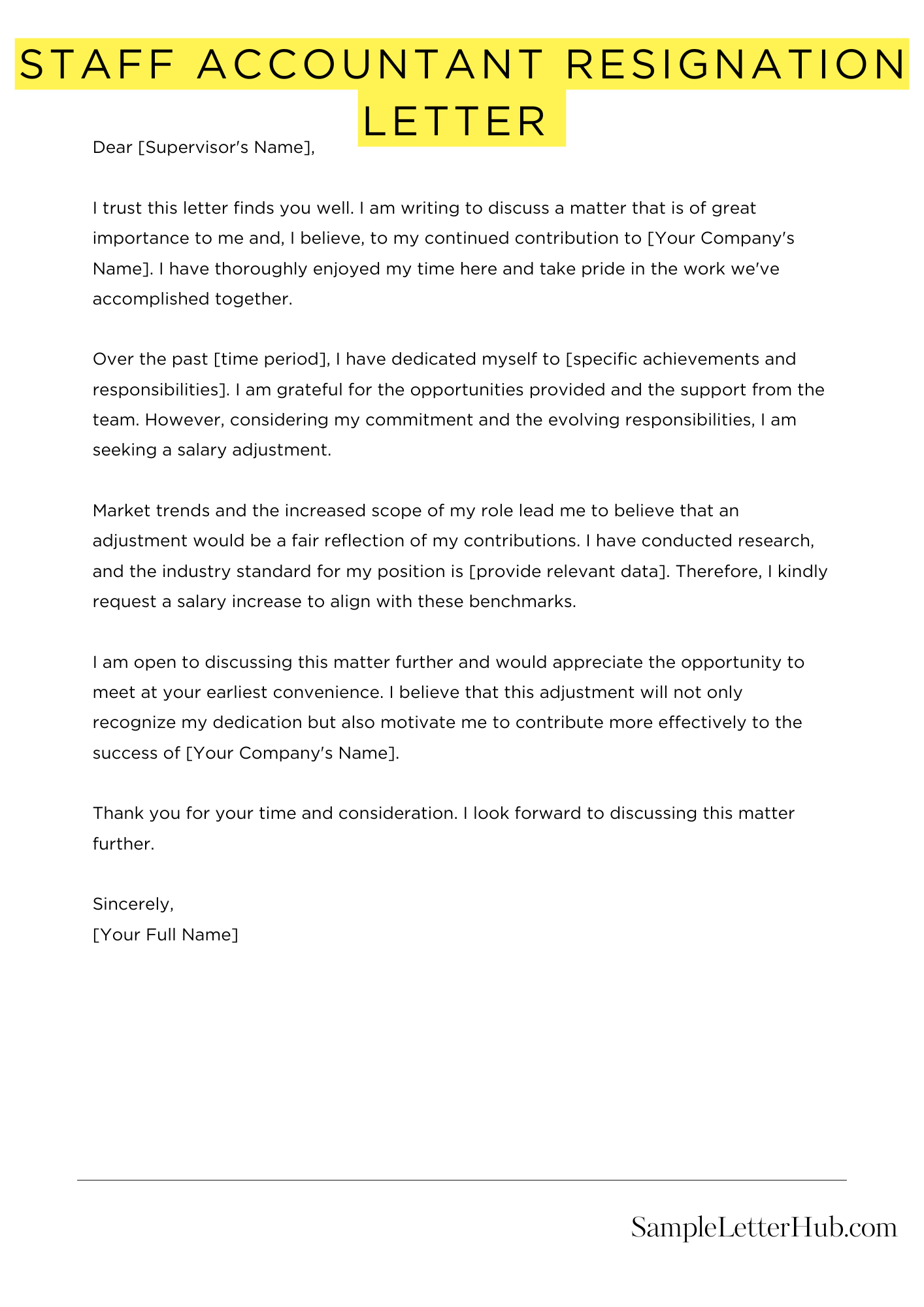When it comes to leaving a job, a clear and professional resignation letter is a must. In this article, we’ll share an example of a staff accountant resignation letter that you can use as inspiration.
In your letter, be polite and humble. Thank your employer for the opportunity to work at the company and express your appreciation for their support. Keep your letter brief and to the point, and avoid getting into personal details or negative comments.
Below, we’ve included a template/example staff accountant resignation letter that you can use as a starting point. Feel free to adapt it to your own situation and needs.
Staff Accountant Resignation Letter
Dear [Manager’s Name],
Please accept this letter as formal notification that I will be resigning from my position as Staff Accountant at [Company Name], effective two weeks from today, [Last Date of Employment].
During my time at [Company Name], I have gained valuable experience and developed my professional skills. I am grateful for the opportunities and support I have received.
I wish you and the company all the best in the future.
Sincerely,
[Your Signature]
Short Staff Accountant Resignation Letter Sample
Please accept this letter as formal notification that I am resigning from my position as Staff Accountant at [Company Name]. My last day of employment will be [Your Last Day]. Thank you for the opportunity to grow and learn during my time here. I wish you and the company continued success. I am happy to assist in the transition process to ensure a smooth handover of my responsibilities.
I wish you all the best with your staff accountant resignation letter.
When it’s time to say farewell, expressing your gratitude and best wishes can make the transition smoother:

How to Write a Staff Accountant Resignation Letter
1. Start with a Formal Introduction
Begin your letter with a formal salutation, such as “Dear [Manager’s Name].” Clearly state your intention to resign from your position as a Staff Accountant, including your last date of employment.
2. Express Gratitude and Appreciation
Take this opportunity to express your gratitude for the opportunities and experiences you’ve gained during your time at the company. Mention specific projects or initiatives that you’re particularly proud of.
3. State Your Reasons for Leaving (Optional)
While it’s not always necessary to provide a detailed explanation for your departure, you may choose to briefly state your reasons for leaving. Keep it professional and avoid being negative or critical.
4. Offer to Help with the Transition
Demonstrate your commitment to a smooth transition by offering to assist in any way possible. This could include training your replacement or providing documentation on your responsibilities.
5. End with a Professional Closing
Conclude your letter with a formal closing, such as “Sincerely” or “Best regards.” Include your signature and typed name below.
6 Most Frequently Asked Questions About Staff Accountant Resignation Letters
When it comes to resigning from your position as a staff accountant, it’s important to do so professionally and in a way that maintains a positive relationship with your employer. Here are the six most frequently asked questions about staff accountant resignation letters, along with their answers:
1. What should I include in my resignation letter?
Your resignation letter should include the following information:
- Your name and contact information
- The date
- The name of the company you are resigning from
- The name of the person you are resigning to
- A statement of your resignation
- Your last date of employment
- A brief expression of gratitude for the opportunity to work at the company
2. How should I format my resignation letter?
Your resignation letter should be formatted in a professional and easy-to-read manner. Use a standard font, such as Times New Roman or Arial, and keep the letter to one page. Left-align your text and use single spacing.
3. What is the proper tone for a resignation letter?
The tone of your resignation letter should be professional and respectful. Thank your employer for the opportunity to work at the company and express your appreciation for their support. Avoid being negative or critical in your letter.
4. How much notice should I give?
The amount of notice you should give depends on your company’s policy and your relationship with your employer. It is generally considered good practice to give at least two weeks’ notice. However, if you have a close relationship with your employer, you may want to give more notice.
5. What should I do if I am asked to stay?
If you are asked to stay, it is important to consider your options carefully. You may want to negotiate a later departure date or discuss other ways to transition out of your role. Ultimately, the decision of whether or not to stay is up to you.
6. What are some common mistakes to avoid in a resignation letter?
Some common mistakes to avoid in a resignation letter include:
- Being negative or critical of the company
- Making personal attacks
- Giving too much notice
- Not giving enough notice
- Not proofreading your letter
Before making the decision to resign from your job, it’s essential to consider the legal aspects:
Understanding your emotions after quitting your job is important. Explore why you might be feeling sad:
Related
- Resignation letter sample
- Forced resignation letter
- Resignation letter due to going abroad
- Resignation letter due to marriage
- Resignation letter due to other opportunity
- Resignation letter due to mistake

